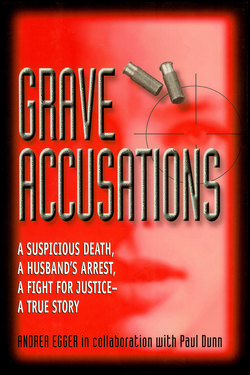Читать книгу Grave Accusations - Paul Dunn - Страница 17
На сайте Литреса книга снята с продажи.
Оглавлениеchapter 9
Truth, Lies and Lie Detectors
Because they thought it could end the case, Paul’s attorneys sent him to Salt Lake City to meet with famed polygrapher David Raskin. That Friday, a choking, sobbing Paul explained the events again—his confusion, Monica’s silence, the blood, Monica’s body blown backwards by the force of the shotgun, her gasping for air, her final shudder—before Raskin asked him the crucial questions. When it was over, Raskin scored the test while Paul paced and chain-smoked outside. He was a wreck by the time Raskin came out.
“I believe you and I’m sorry, sorry for what you’ve been through and the pain you’ve endured. I’d stake my professional reputation on it: you’re telling the truth.” Raskin never wavered from that view. But a lot of skeptics in Farmington thought Raskin was a hired gun for the defense and that, of course, he would believe his client innocent and make sure Paul passed the test.
Paul said, “Bless his heart. I’ve heard that angels come to you and you don’t know they’re angels. I believe David Raskin is an angel.”
Raskin told Paul, “I wish I had videotaped the test, because it is a classic example of someone passing the test.” He explained that a negative-six or under is failing, between negative and positive-six is inconclusive and anything above a positive-six is passing. Paul got a positive-eighteen.
Ecstatic wouldn’t be a strong enough word to use for Paul’s emotions when he heard his score. The prosecution would have to let him go now and give Titus and Mitchell the results. Titus said he would take the polygraph results to Whitehead first thing that Monday morning and hopefully end the case. But Paul wanted to go right then and get it over with.
“Let me be the lawyer,” was Titus’ unemotional response.
An exhausted Paul went to Officer Bob Fain’s house, where his father was staying, to tell him the good news. Later, Anita came over to her sister Margaret’s house where Paul was staying. Paul looked to her feeling overwhelmed. “Oh my God, Anita, I have some news.”
Anita backed away and crossed her arms. “Did you fail?” Turmoil darkened Anita’s face. She backed further away.
“You need to look at it.” He handed her the pages.
Despite passing the polygraph, he asked himself, could Anita think he killed Monica?
Mitchell and Titus took the report to the prosecutor. Unfortunately for Paul, unlike in the Eckstein case, Whitehead this time appeared uninterested in the results of the polygraph test. Whitehead knew he had a case he could win—polygraph or no polygraph. He tossed the results aside.
“I don’t care about any of that now! He will be charged!” Whitehead exclaimed.
When Paul learned the district attorney had said the polygraph test didn’t matter, he moved around in a morose state. Mainly, he moped about Monica’s death, not seeing his babies and the lack of support from the police department. He couldn’t believe his state police officer friend, Noe Galvan, was investigating the case.
When Galvan had problems and almost lost his job, Paul gave Galvan the benefit of the doubt. When he saw Galvan back in uniform after an internal investigation, Paul had made a point to say he was glad to see him back on duty.
“He was my friend.” And officers were supposed to stick together. It was kind of an unspoken rule that fellow officers—people who care about and spend time with each other outside of work—share special bonds.
Paul felt intense bewilderment and betrayal at Galvan’s heading the investigation. “It was like someone ripped your heart out, stuffed it in your face and said, ‘How about them apples?’”
Paul never once tried to get anyone to believe he was perfect, but he felt his record of honesty and loyalty should have counted for something. No one listened when Paul explained Monica shot herself with his shotgun.
And he had never been lonelier. The Sanchez family wouldn’t let him see Racquel and Diane. They wouldn’t even let his father, Harvey “Buzz” Dunn, collect the girls after agreeing to the visit April 14, ten days after Monica’s death. They turned Buzz away at the door.
Paul decided to go over there himself. When a Farmington police sergeant called to warn the family Paul was on his way, it caused a panic in the Sanchez household. The only way the sergeant would have known about Paul’s visit was if Paul told him. Some friend he turned out to be.
The Sanchezes ended up calling in San Juan County Sheriff’s deputies when Farmington police officers told them they didn’t have enough officers to watch their house. Why the sergeant who made the call causing all the frantic behavior wouldn’t personally “serve and protect” the Sanchezes wasn’t clear.
